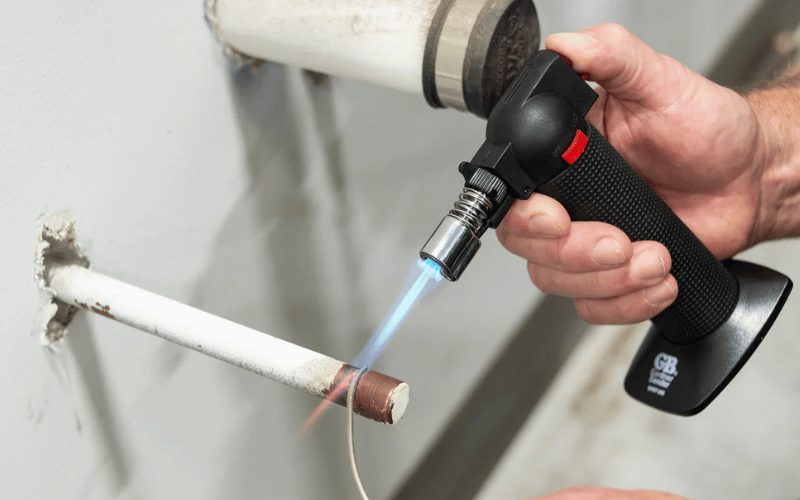Can I use butane torch to solder?

Introduction
Welcome to our comprehensive guide on using a butane torch for soldering. In this article, we will explore the practicality, benefits, and comparison of using a butane torch for soldering tasks. Additionally, we’ll provide valuable tips and safety precautions for efficient soldering with a butane torch. Whether you’re a hobbyist or a professional, this guide will equip you with the knowledge needed to make informed decisions about using a butane torch for your soldering projects.
Answer to the Question
When it comes to the question at hand, the use of butane torches in soldering presents a number of advantages that make it a preferred choice for many enthusiasts and professionals. Let’s delve deeper into the specifics to understand why butane torches are a popular tool for soldering.
- Power and Precision: Butane torches offer a precise and concentrated flame, allowing for accurate heating of soldering components. This level of control is essential for achieving clean and reliable solder joints, especially in intricate electronic circuits.
- Portability and Convenience: One of the key advantages of using a butane torch for soldering is its portability and convenience. Unlike traditional soldering stations, butane torches are not tethered to a power outlet, offering the flexibility to work in various locations.
- Adjustable Temperature Control: Butane torches often come equipped with adjustable temperature controls, providing the flexibility to set the ideal heat level for different soldering tasks. This adaptability is particularly beneficial when working with a range of materials and components.
By exploring these key features and benefits, it becomes evident that butane torches are well-suited for a wide array of soldering applications, from intricate electronics to jewelry making and plumbing repairs.
Benefits of Using a Butane Torch for Soldering
Portability and Convenience
Using a butane torch for soldering offers exceptional portability and convenience, making it a versatile tool for various applications. Let’s delve deeper into the specific aspects that contribute to its portability and convenience:
- Compact Size: The butane torch is compact, lightweight, and easy to carry, allowing soldering tasks to be performed in diverse environments, including workshops, outdoor settings, and tight spaces.
- Gas-Powered Operation: With its reliance on butane gas, the torch eliminates the need for electrical cords, providing the freedom to use it without proximity to power outlets.
- Portable Fuel Source: Butane fuel canisters are readily available, facilitating easy refueling and prolonged usage without dependency on external power sources.
- Quick Ignition: The torch features swift ignition mechanisms, enabling rapid readiness for soldering tasks, thus enhancing overall efficiency.
Adjustable Temperature Control
Adjustable temperature control is a key feature of modern butane torches that provides versatility and precision in soldering applications. With adjustable temperature settings, users have the flexibility to customize the heat output according to the specific requirements of the soldering task, ensuring optimal results and minimizing the risk of damage to delicate components.
Key points to consider about adjustable temperature control:
- Provides precise heat regulation for various soldering materials and joint sizes
- Enables efficient adjustment for different soldering techniques, such as surface mount and through-hole soldering
- Facilitates the use of different solder types, including lead-free and traditional solders, with appropriate temperature settings
- Enhances safety by preventing overheating and reducing the likelihood of thermal damage to surrounding components
Versatility in Soldering Projects
When it comes to soldering, versatility is key. A great soldering tool should be able to handle a wide range of projects, from intricate electronics to larger metalworking tasks. Here are some aspects of versatility that are important to consider:
- Variable Power Levels: A versatile soldering tool should offer adjustable power levels to accommodate different types of soldering tasks. Whether you’re working on delicate circuit boards or heavy-duty metal joints, having the ability to control the power output is essential.
- Interchangeable Tips: Soldering projects come in all shapes and sizes, and having a variety of interchangeable tips at your disposal can greatly expand your capabilities. Different tips allow for precise control over the soldering process, making it easier to tackle diverse projects with confidence.
- Compatibility with Various Materials: From copper and aluminum to stainless steel and brass, soldering projects often involve a wide range of materials. A versatile soldering tool should be compatible with various materials, ensuring reliable and high-quality results across different project types.
- Integrated Safety Features: Safety should always be a top priority in soldering projects. A versatile soldering tool may include features such as temperature control, auto-shutoff, and insulated handles to minimize risks and protect the user during use.
Comparison with Other Soldering Methods
Butane Torch vs. Soldering Irons
When it comes to soldering, both butane torches and soldering irons have their own advantages and applications. Let’s delve deeper into the specific characteristics of each tool to better understand when and where they are most suitable.
The butane torch is a versatile tool that provides high heat and can be used for various applications beyond soldering. It is portable, easy to use, and offers quick heat-up times. Some key features of butane torches include:
- Adjustable flame control for precise soldering
- Refillable butane tank for long-term use
- Compact and lightweight design for portability
- Great for outdoor or on-the-go soldering projects
Common applications of butane torches include jewelry making, plumbing, culinary use, and DIY repairs. However, it may not be the ideal choice for delicate electronic components due to its high heat output.
The soldering iron, on the other hand, is a precision tool designed specifically for soldering electronic components, electrical circuits, and small metal items. It offers controlled and consistent heat output, making it suitable for delicate soldering tasks. Key features of soldering irons include:
- Adjustable temperature control for versatility
- Interchangeable soldering tips for different applications
- Ergonomic handle for comfortable use
- Grounded power cord for safety
Common applications of soldering irons include circuit board assembly, wire repairs, electronics soldering, and jewelry repair. While soldering irons provide precision and control, they may not be as portable or versatile as butane torches.
Butane Torch vs. Electric Soldering Stations
When it comes to soldering, choosing the right equipment is crucial for achieving the best results. Two popular options for soldering are the butane torch and electric soldering stations. Let’s take a closer look at the differences between these two soldering tools:
The butane torch is a portable and versatile tool that uses pressurized butane gas to produce a hot flame for soldering. It is commonly used for jewelry making, plumbing, and electronics repair. Some key features of the butane torch include:
- Portability and ease of use
- Adjustable flame size and temperature
- Quick heating and cooling
- Refillable butane fuel
Electric soldering stations, on the other hand, are stationary units that consist of a soldering iron, a stand, and a power supply. These stations offer precise temperature control and are suitable for a wide range of soldering applications. Here are some advantages of electric soldering stations:
- Precise temperature control
- Thermostat-regulated soldering irons
- Multiple tip options for various soldering tasks
- Enhanced safety features
When deciding between a butane torch and an electric soldering station, it’s important to consider the specific soldering tasks, workspace conditions, and safety requirements. Both tools have their unique advantages and are suitable for different soldering scenarios.
Tips for Using a Butane Torch for Soldering
Proper Handling and Safety Precautions
When using a butane torch for soldering, it is crucial to observe proper handling and implement safety precautions to prevent accidents and ensure a secure working environment. Below are detailed guidelines for handling a butane torch safely:
- Always use the butane torch in a well-ventilated area to prevent the accumulation of flammable gases.
- Check the condition of the torch before each use, ensuring that it is free from leaks and damages.
- Wear appropriate protective gear, including safety goggles and heat-resistant gloves, to shield yourself from potential hazards.
- Keep the butane torch away from combustible materials and surfaces to avoid accidental fires.
- Store the butane fuel in a cool, dry place, away from direct sunlight and heat sources.
- Never leave the butane torch unattended while it is in operation to prevent unforeseen accidents.
Implementing these safety measures will not only enhance your soldering experience but also prioritize the well-being of yourself and those around you.
Optimal Soldering Techniques
Soldering is the process of joining two or more metal components together by melting and flowing a filler metal into the joint. To achieve high-quality soldering results, proper techniques and methods need to be employed. Here’s a detailed look at the optimal soldering techniques:
- Clean the Surfaces: Before beginning the soldering process, it’s crucial to thoroughly clean the surfaces of the metal components. Use a fine abrasive material or a chemical cleaner to remove any oxidation, oil, or dirt. This ensures a strong, reliable bond between the metals.
- Use of Flux: Applying flux to the metal surfaces before soldering helps in removing any remaining oxides and promotes the flow of solder. It also protects the surfaces from oxidation during the heating process, contributing to a clean joint.
- Proper Heating Technique: Heat control is essential in soldering. It’s important to apply the right amount of heat to the joint to melt the solder, but excessive heat should be avoided as it can damage the components. For larger joints, consider using a heat sink to prevent heat damage to sensitive areas.
- Application of Solder: When the surfaces reach the appropriate temperature, carefully feed the solder into the joint, allowing it to flow evenly. Avoid moving the components until the solder has solidified to prevent weak joints.
- Cooling and Inspection: After soldering, allow the joint to cool naturally. Once cooled, inspect the joint for any visual defects or irregularities. Test the joint to ensure a secure and reliable connection between the metal components.
Conclusion
In conclusion, a butane torch can be a practical and versatile tool for soldering tasks. Its portability and adjustable temperature control make it convenient for various projects, and its versatility allows for use in a wide range of soldering tasks. However, it is important to note that a butane torch may not be suitable for all soldering needs and may not be as efficient as traditional soldering irons or electric soldering stations.
When considering using a butane torch for soldering, it is important to weigh the benefits and limitations compared to other soldering methods. While a butane torch may offer convenience and versatility, it may not provide the same precision and control as other tools. It is also crucial to follow proper handling and safety precautions when using a butane torch for soldering, as well as utilizing optimal soldering techniques for the best results.
In the end, the decision to use a butane torch for soldering ultimately depends on the specific project and individual preferences. With its unique advantages and limitations, a butane torch can be a valuable addition to any soldering toolkit. We hope this guide has provided valuable insights to help you make an informed decision on whether a butane torch is the right tool for your soldering needs.
